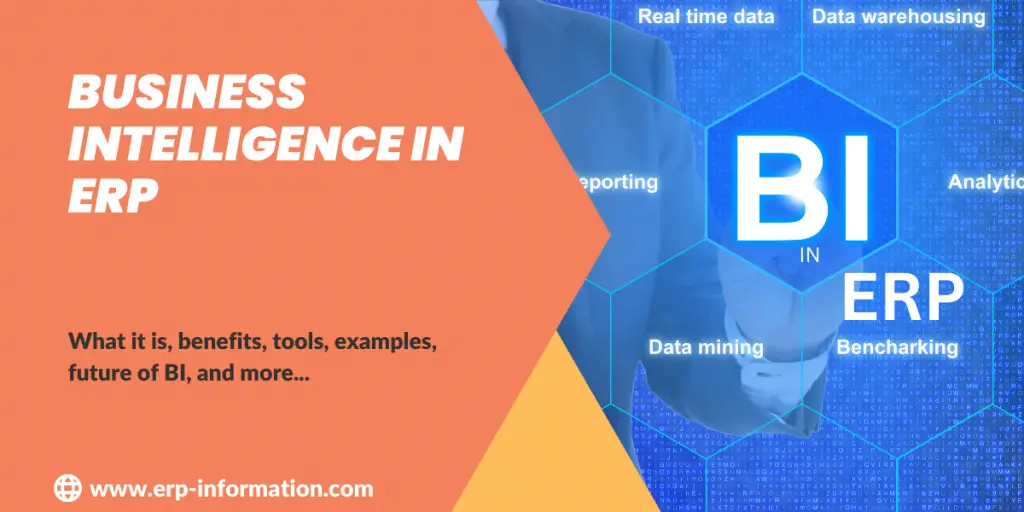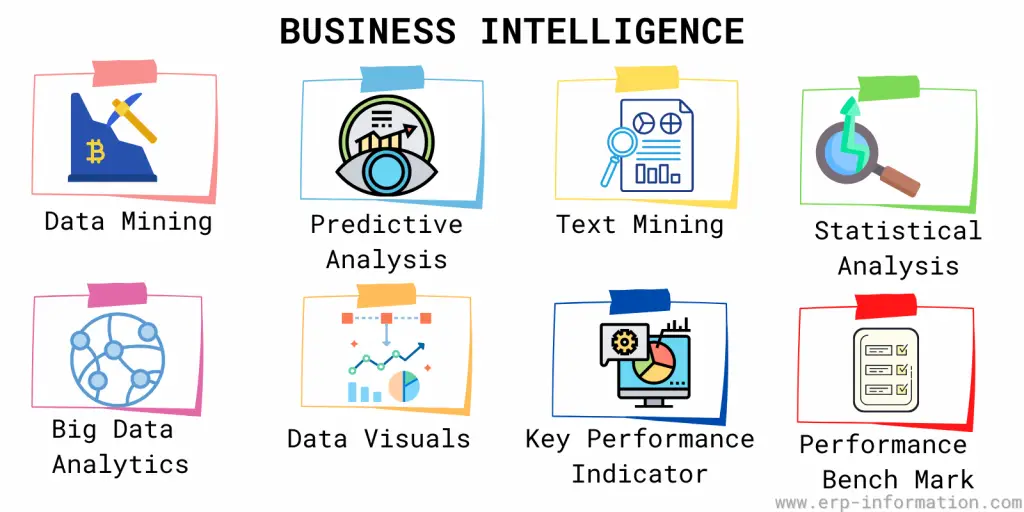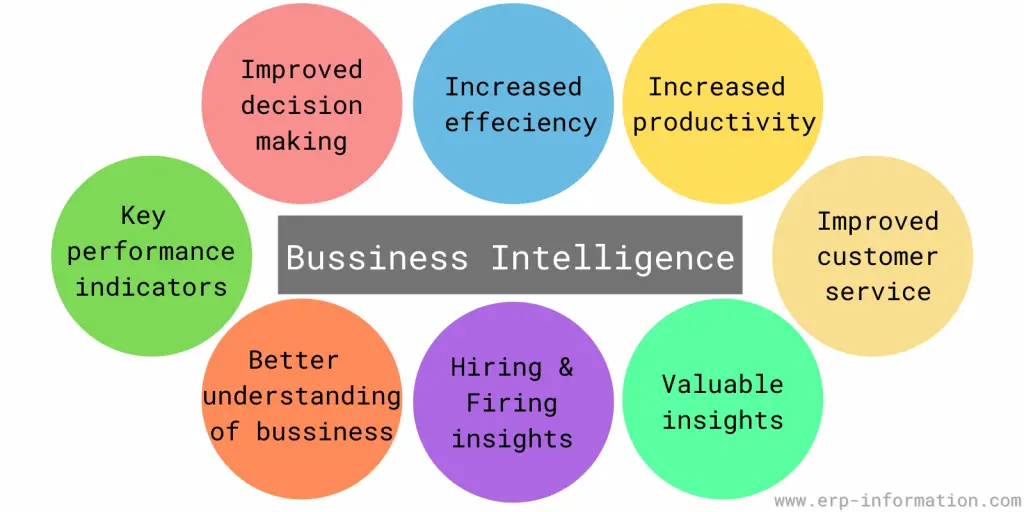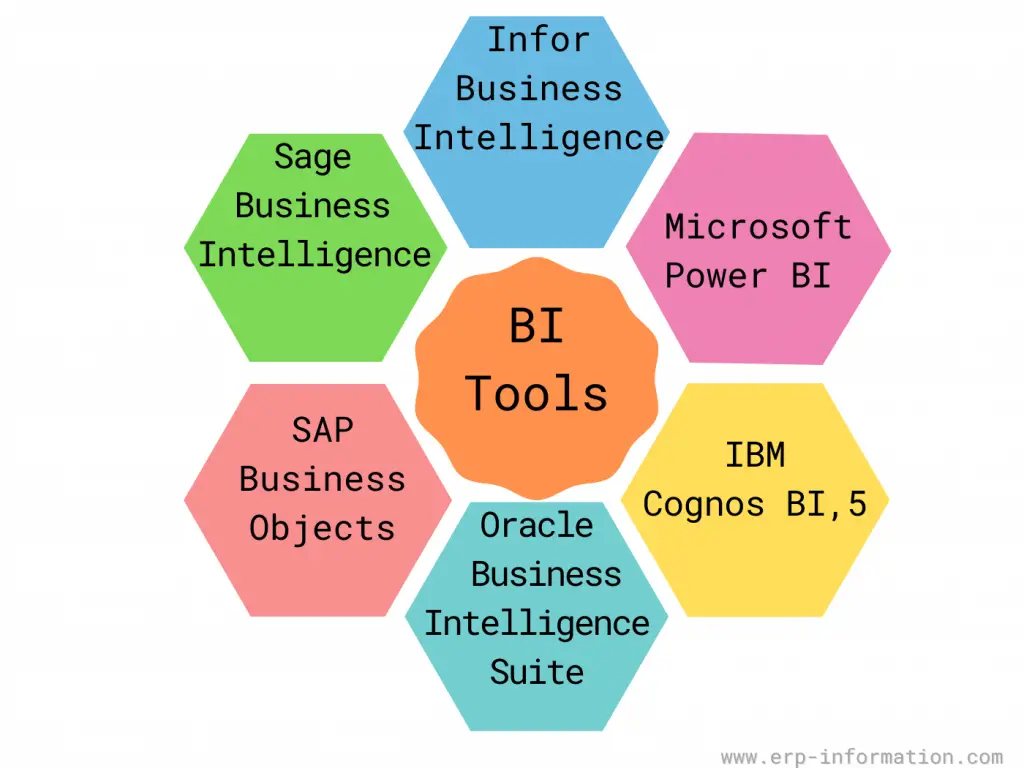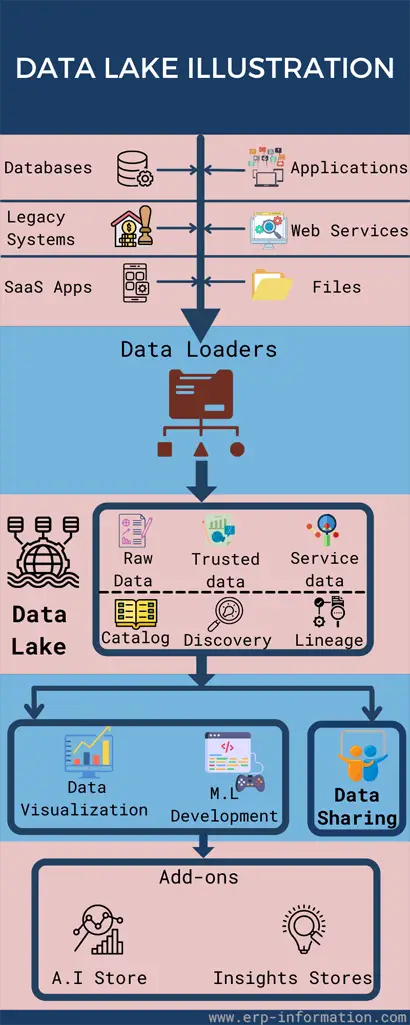Enterprise Resource Planning (ERP) systems are essential for businesses of all sizes. They allow companies to manage their resources and operations more effectively and efficiently.
Business Intelligence (BI) is a critical component of an ERP system.
Business Intelligence in ERP provides users with valuable insights into their business data.
In this blog post, we will explore the role of BI in ERP systems. We will also look at the benefits of using BI in ERP systems and some examples of integration of both.
An infographic on Data Lake demonstrates a complete overview of enterprise data.
Finally, we will discuss new trends and their future in BI in ERP systems.
What is Business Intelligence (BI)?
Business Intelligence refers to the process of turning data into insights. BI tools allow users to analyze their business data points and find trends and patterns. This can help them make better decisions about their business. BI can be used in all aspects of business, from marketing to finance to operations.
BI in ERP helps analyze human resources productivity and satisfaction with work and helps take corrective measures. All these factors help in increasing the efficiency of an organization.
BI is not only used for decision-making but also for performance monitoring. BI aims to help an organization make better decisions, improve its performance, and get a competitive edge over other businesses.
Why Business Intelligence is practical in ERP systems?
The role of Business intelligence in ERP systems is becoming increasingly important. With the vast amounts of data now being processed by ERP systems, it is essential to have a tool to help process and make sense of all this ERP data.
ERP systems contain a great deal of data that can be used for Business Intelligence purposes. The data can include sales, inventory, production, customer orders, and more. By using BI tools, organizations can analyze this raw data to understand better what is happening in their business. This can help them make better decisions about allocating resources, improving operations, and more.
Companies can use these tools with core business processes to provide a complete business view. In many cases, business intelligence and ERP systems together can access and view data quickly.
The benefits of using Business Intelligence in ERP
Below are some benefits of Business Intelligence in ERP :
Improved decision-making
It can help organizations make better decisions by providing relevant and timely information. BI can also help organizations spot trends and patterns that may not be detectable through manual data analysis.
A better understanding of business performance
It can help organizations track the performance of their business over time. This can help them identify areas where they need to improve their performance.
Increased efficiency and productivity
It can help employees be more productive by providing information that helps them do their jobs better.
BI can also help organizations identify areas where they need to make changes to improve the efficiency of their operations.
Improved customer service
It can help organizations better understand their customers and what they want.
This can help customer relationship management systems to provide the best possible customer service.
Access to valuable insights into business data
Businesses can use the data processed by ERP systems for Business Intelligence purposes. By using the BI software system, organizations can analyze this data to understand better what is happening in their business.
This can help them make better decisions about allocating resources, improving operations, and more.
Hiring and firing decisions
Companies can also use it to help with hiring and firing decisions. By analyzing data about employee performance, organizations can make better decisions about who to hire and who to fire.
In addition, it helps in avoiding biases and office politics while making decisions.
Measuring key performance indicators (KPI)
Some key performance indicators that are typically measured using BI in ERP systems include:
- Sales growth
- Productivity
- Profitability
- Customer satisfaction
- Employee satisfaction
- Business processes performance metrics.
These are just a few examples, and the list of KPIs that can be measured using BI in the ERP system is virtually endless.
By understanding which KPIs are most important to your business, you can use BI software to understand better your company’s performance and where the business can improve.
Integration of business intelligence in ERP
BI systems in ERP help businesses in different ways. ERP is a process management software that helps with manufacturing, inventory, financials, and supply chain.
This system pulls data from different parts of the company so that people can make better decisions. BI also helps businesses to understand data, but it goes a step further by creating visualizations (like charts and graphs) to make the information easier to understand.
ERP systems are most helpful at the operational level, while BI is most helpful at the strategic level.
An OLTP(Online Transaction Processing) system is a data processing system used by enterprises to record transactions. An example of an OLTP system is ERP. Business intelligence uses an OLAP system, which offers multidimensional analytical capabilities.
In this way, integration of BI and ERP enables enhanced reporting capabilities, more efficient analytics solutions, and better overall visibility across the company’s activities. In addition, BI in ERP gives companies invaluable insight into how resources are being used and how decisions affect performance, allowing them to effectively manage their operations for success.
Example of ERP Software with BI integration
We can find ERP with Business Intelligence integration in our day-to-day lives.
One such example is the Coca-Cola company. The Coca-Cola Company uses BI solutions to help it make better decisions about its business.
For instance, the company uses data analysis to track sales and inventory levels. This allows them to ensure that they have enough stock to meet customer demand.
The company also uses historical data to track sales data on a regional level. This helps them identify which regions are performing well and which ones need improvement.
Popular BI system in ERP
Following are some popular Business Intelligence systems that are used in ERP systems:
Sage Business Intelligence
Sage Business Intelligence is a BI system designed for use with the Sage ERP system.
The system includes tools for data analysis, reporting, and dashboards. It also has features for budgeting and forecasting. This allows organizations to get a complete view of their business performance.
SAP Business Objects
SAP Business Objects is used in ERP systems. It provides users with the ability to create reports and study the facts.
Oracle Business Intelligence Suite
Oracle Business Intelligence Suite is a comprehensive set of tools that enables executives and analysts to access, analyze, and share information from a centralized location.
The suite includes Oracle’s flagship product, Business Intelligence Enterprise Edition (OBIEE), and additional products such as Oracle Data Integrator, Oracle Endeca Information Discovery Studio, and Oracle Business Process Analysis Suite.
IBM Cognos BI
IBM Cognos BI is a comprehensive system that allows users to analyze inputs and share insights. In addition, it offers a wide range of features, including:
- Data exploration and visualization
- Report creation
- Dashboard design
- Collaborative analysis
Microsoft Power BI
Power BI is a system offered by Microsoft. It allows users to connect to data from various sources, including Excel files, SQL Server databases, and Azure cloud services.
Infor Business Intelligence
Infor Business Intelligence is a comprehensive BI system that enables you to analyze data from different perspectives to make better business decisions. It offers a wide range of features, including reporting, dashboards, analysis, and visualization.
Each significant ERP provider has its business intelligence suite integrated with the ERP software system.
For example, Sage Business Intelligence is often used with Sage ERP software. Likewise, SAP Business Objects is often used in conjunction with SAP ERP software, and so on.
The business intelligence suites offer data mining and reporting features to dashboards and predictive analytics.
New trends in enterprise business intelligence
Following are the new trends in Business processes:
The move toward self-service BI
Business users are increasingly taking on the role of data analysts, and they want tools that allow them to do their analysis. As a result, we see a move towards self-service BI software that gives business users more control over their data.
What is self-service BI software?
The self-service BI software allows business users to access and analyze data independently. They typically include various features, from the graphical view of data to reporting to dashboards. As a result, business users can use the self-service BI tool to get insights into their data and make better decisions about their business.
Increased emphasis on data visualization
Visual presentation of statistics is becoming increasingly important as businesses try to make sense of ever-larger amounts of data. As a result, the BI tool incorporates more features that allow users to create visualizations easily.
What is Data visualization?
It is the process of transforming data into a graphical representation that is easy to understand. It involves creating charts, graphs, and other visual data graphics to be easily understood. Business users can use diagrams to get insights into their data and make better decisions about their business.
Expansion of BI to include big data and analytics
Big data and analytics are becoming more important as businesses try to get actionable insights into their ever-growing data warehouse. As a result, BI tools are expanding to include features that allow users to work with big data, which is likely to continue in the future.
The growing use of artificial intelligence and machine learning in BI
Artificial intelligence(AI) and machine learning are becoming more critical as businesses seek hidden insights into their data. The BI tool incorporates features that allow users to use these technologies.
What is AI?
AI is a computer science branch that designs and develops intelligent computer systems. These systems can perform tasks that usually require human intelligence, such as understanding natural language and recognizing objects. As a result, businesses can use AI to get insights into their data and make informed decisions about their business.
What is machine learning?
Machine learning is an AI that allows computers to learn from facts without being explicitly programmed. Businesses can use machine learning to get insights into their statistics and make better decisions about their business.
The increasing importance of BI governance
BI systems become more powerful. It is increasingly important to have proper governance to ensure that data is adequately managed and accessed by authorized users. As a result, the BI solutions incorporate features that allow businesses to implement strong governance policies.
What is BI governance?
Bi-governance is the process of ensuring that information is appropriately managed and accessed by authorized users. It involves setting up policies and procedures for managing and accessing data and enforcing them. Businesses can use BI governance to ensure that their information is handled correctly and used effectively.
The rise of the data scientist
Data scientists are becoming increasingly important as businesses seek to make sense of their data.
A data scientist is a person who specializes in analyzing and interpreting facts. In addition, they typically have strong math and statistics visualization skills and machine learning. As a result, businesses can use data scientists to get insights into their statistics and make better decisions about their business.
The emergence of the data lake
Data lakes are becoming increasingly popular in big businesses as they seek to store and analyze their ever-growing complex data sources.
What is a data lake?
A data lake is a large repository for storing all data types, including structured and unstructured data. Businesses can use data lakes to store and analyze all that input.
The following infographics illustrate the role of a data lake in an enterprise.
The future of Business Intelligence in enterprise resource planning
The future of Business Intelligence in ERP systems is bright. Intelligent systems will continue to evolve and provide users with even more valuable insights into their business figures.
As businesses become increasingly data-driven, they will need deep analytical tools to help them make sense of all the data they are collecting. As a result, BI in ERP will allow businesses to optimize their operations and cost savings, improve their bottom line, and compete more effectively in the global economy.
In the future, BI will be an essential part of the ERP system and help businesses achieve even greater success.
Conclusion
Business Intelligence in ERP is a valuable tool that can lead to better decision-making, increased efficiency and productivity, improved customer service, and access to valuable insights into business data.
We hope you have found this blog post helpful.
